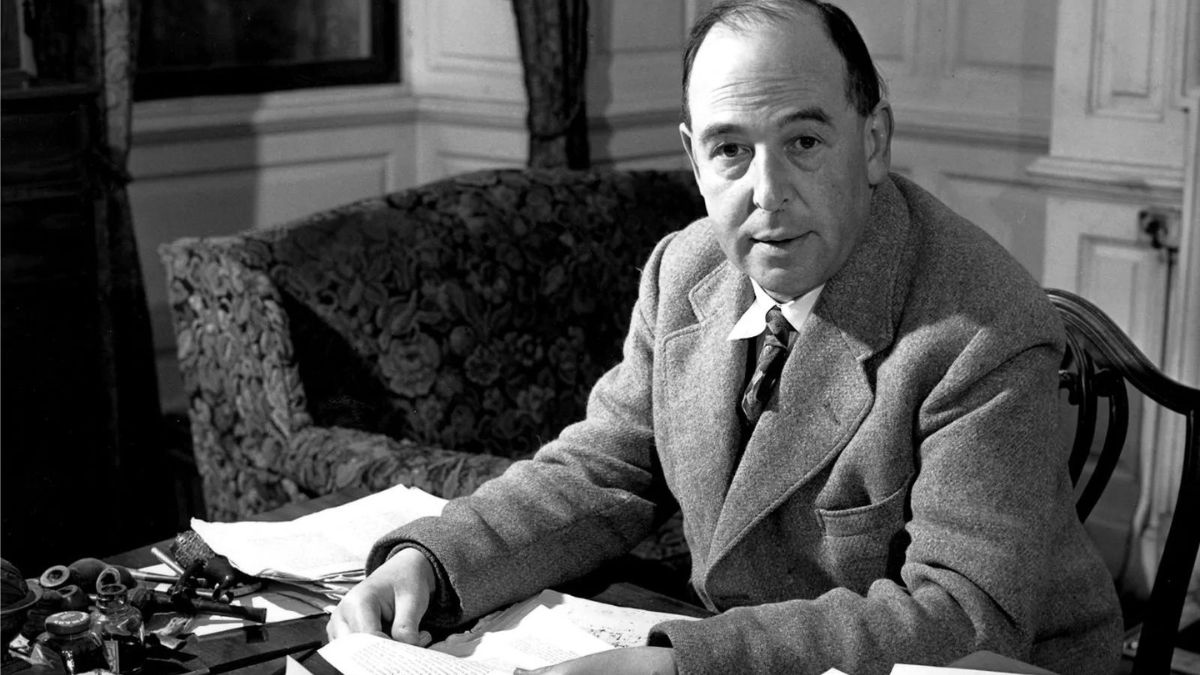

How the World Met C.S. Lewis
“Made for another world” but helping this one of believers and skeptics alike understand Christian hope for the past 80 years.
04/17/24
John Stonestreet and Stefan Wilson

In the tumultuous era of World War II, amidst the chaos and uncertainty, Clive Staples Lewis offered a voice of reason and faith to a nation under constant threat. The BBC asked Lewis to give a series of radio broadcasts in response to the pressing need for moral guidance and spiritual reassurance. From 1941-1944, Lewis gave a total of 25 of these radio addresses, the last of which aired 80 years ago this month. These talks were later compiled into the bestselling and beloved book, Mere Christianity.
The reach of Lewis expanded beyond his radio broadcasts. He is perhaps most well-known for the fictional children’s series, The Chronicles of Narnia, published between 1950-1956. These delightful stories depict the Christian story of the world. In fact, among the most consistent themes in all of Lewis’s writings is the truth and relevance of Christianity for all people and all times.
Lewis recognized that the truths of Christianity held the key to the moral dilemmas and existential questions of his time. In his broadcasts, Lewis presented Christianity not just as a set of dogmas or rituals but as a worldview that could withstand scrutiny. With typical clarity, he articulated the timeless truths of the Christian faith in a way that appealed to both believers and skeptics. His approach was marked by clear writing, logic, and a deep understanding of human nature. He had a way of making complex subjects simple without being simplistic, perhaps seen best in his ability to confront logical fallacies with good humor and common sense. For example, he wrote,
Creatures are not born with desires unless satisfaction for those desires exists. A baby feels hunger: well, there is such a thing as food. A duckling wants to swim: well, there is such a thing as water. Men feel sexual desire: well, there is such a thing as sex. If I find in myself a desire which no experience in this world can satisfy, the most probable explanation is that I was made for another world.
Lewis’ ability to use plain imagery to drive home important concepts was a hallmark of his brilliance and skill that flowed from his view of the inherent link between truth and imagination. As he put it, “For me, reason is the natural organ of truth; but imagination is the organ of meaning. Imagination, producing new metaphors or revivifying old, is not the cause of truth, but its condition.”
Lewis’ work has left a legacy spanning, so far, the last 80 years, and most likely into the future. Mere Christianity remains a bestseller that is a consistent feature on lists of the top Christian books of the century and often cited by notable pastors, thinkers, and authors. The late Tim Keller said, “[Lewis] is a man of imagination. … no one has ever said [what he said] as well as he did.”
Lewis’ legacy is about much more than a man who became famous. It is about the timeless impact of truth when carefully applied to the cultural moment. Lewis lived in a time and place in desperate need of hope. He offered that hope by articulating the truths of the Christian worldview. Lewis did not bring novelty to the people of Britain during the war. He simply brought the truth and communicated it in a way that could be understood and applied.
There will never be a time when truth is not needed, but it is most needed in a moment like ours, when truth is rejected, relativized, and subjectivized, and in which contextual feeling is prized above all else. We might not face the imminent danger of Nazi bombers overhead, but we live in a time filled with other sources of uncertainty and unrest. Just as in Lewis’ day, the hope offered by Christianity is the antidote to the anxiety our culture swims in.
It is no surprise then that Lewis is still read by millions, Christians and non-Christians alike. His legacy endures as we strive to apply the truth to our cultural moment like he did.
This Breakpoint was co-authored by Stefan Wilson. For more resources to live like a Christian in this cultural moment, go to breakpoint.org.
Have a Follow-up Question?
Up
Next

Related Content

© Copyright 2020, All Rights Reserved.













